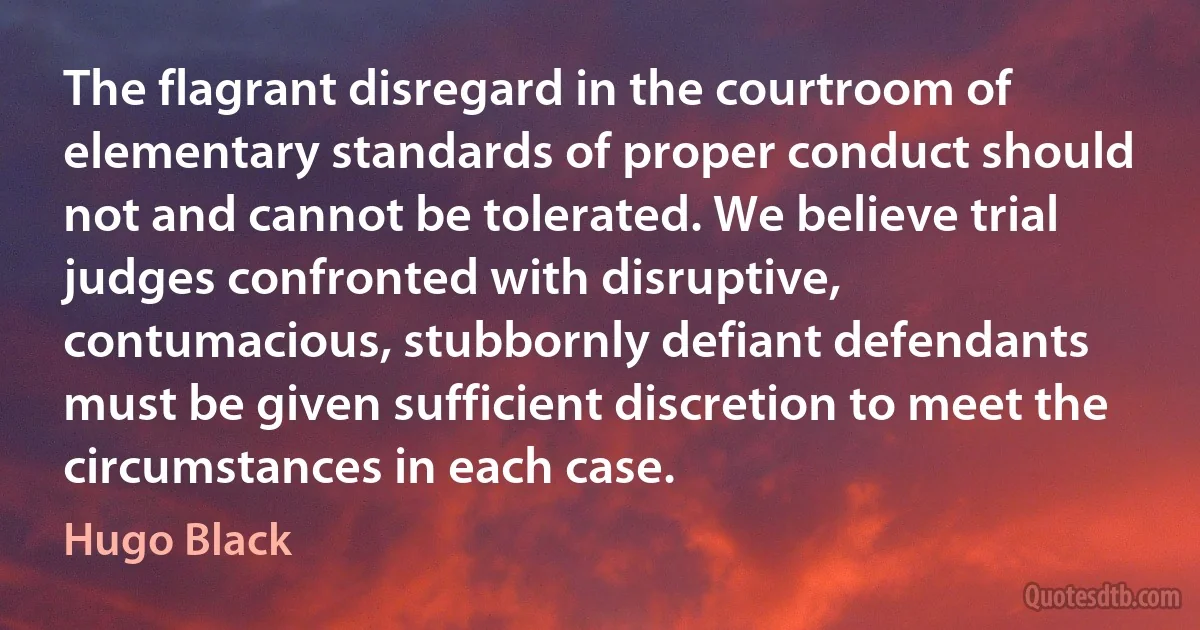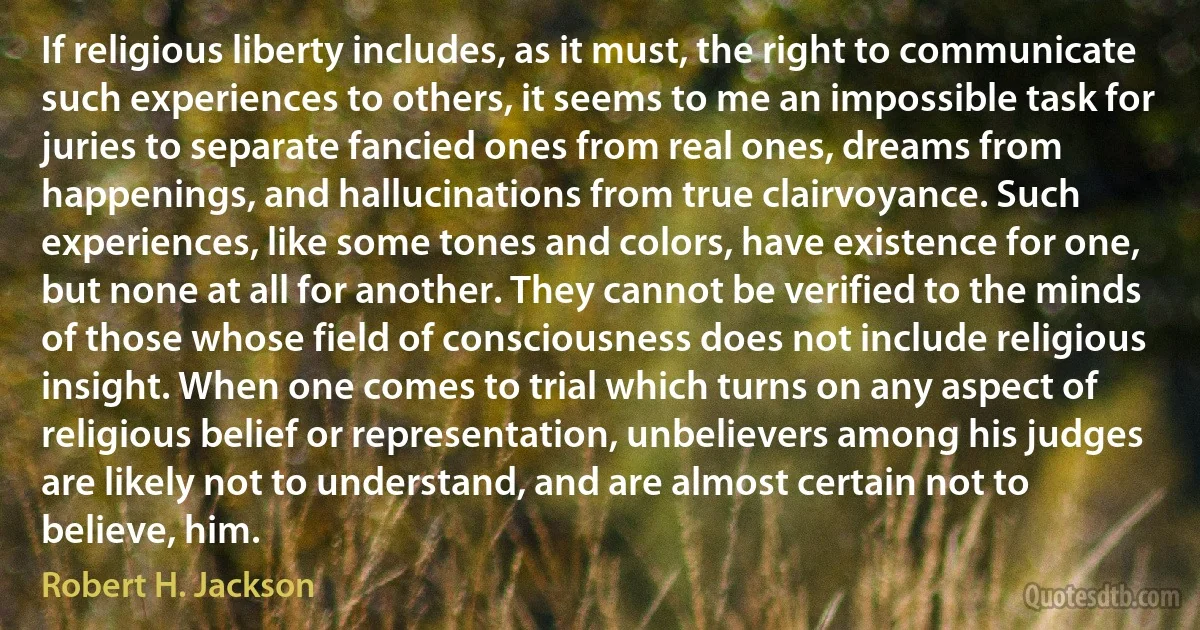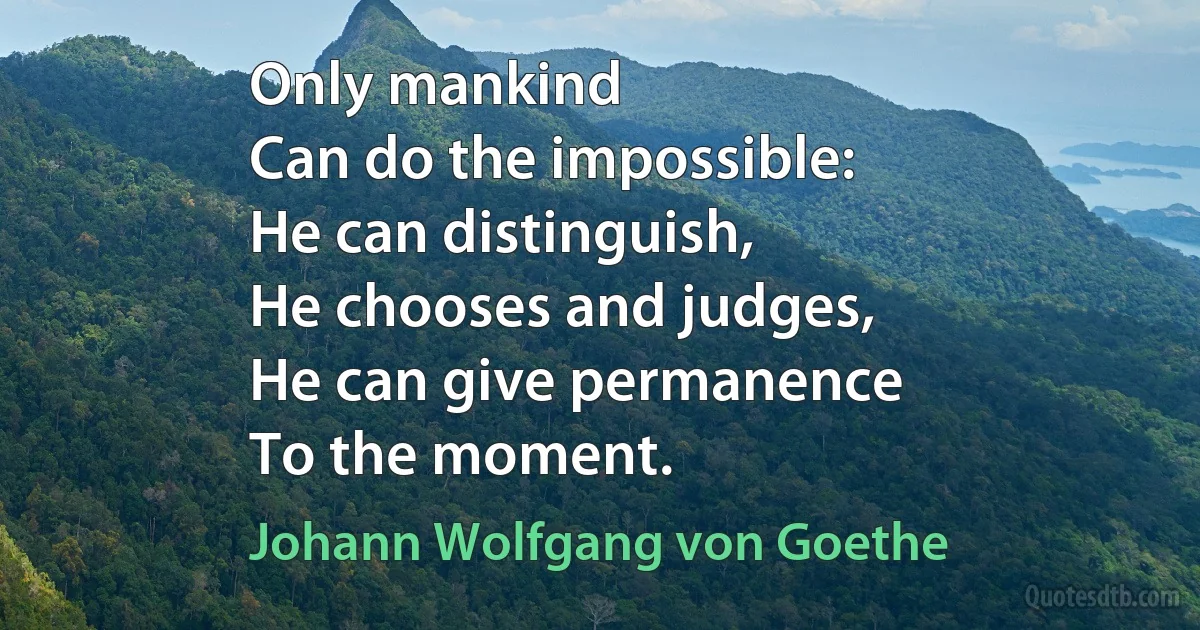Judges Quotes - page 9
So I really don't care about anything he [God] has got to say, and if he came down from heaven right now, in a big pair of hobnail boots, waving the book of Judges in my face, I'd simply tell him what I tell every other evangelising prick I meet: "No thanks. I'm not interested in your phony salvation. I'd prefer damnation. Now piss off, I've got some sinning to do."

Pat Condell
It is said that within the council chamber the judges were naturally leaning toward acquittal. It becomes clear why, at that point, as justification for the verdict, it became vitally important to turn up some damning evidence, a secret document that, like God, could not be shown, but which explained everything, and was invisible, unknowable, and incontrovertible. I deny the existence of that document.... a document concerning national defense that could not be produced without sparking an immediate declaration of war tomorrow? No! No! It is a lie, all the more odious and cynical in that its perpetrators are getting off free without even admitting it. They stirred up all of France, they hid behind the understandable commotion they had set off, they sealed their lips while troubling our hearts and perverting our spirit. I know of no greater crime against the state.

Émile Zola
How could anyone expect a court martial to undo what another court martial had done?
I am not even talking about the way the judges were hand-picked. Doesn't the overriding idea of discipline, which is the lifeblood of these soldiers, itself undercut their capacity for fairness? Discipline means obedience. When the Minister of War, the commander in chief, proclaims, in public and to the acclamation of the nation's representatives, the absolute authority of a previous verdict, how can you expect a court martial to rule against him?

Émile Zola
When we went to school we were told that we were governed by laws, not men. As a result of that, many people think there is no need to pay any attention to judicial candidates because judges merely apply the law by some mathematical formula and a good judge and a bad judge all apply the same kind of law. The fact is that the most important part of a judge's work is the exercise of judgment and that the law in a court is never better than the common sense judgment of the judge that is presiding.

Robert H. Jackson
No one will question that this power is the most dangerous one to free government in the whole catalogue of powers. It usually is invoked in haste and excitement when calm legislative consideration of constitutional limitation is difficult. It is executed in a time of patriotic fervor that makes moderation unpopular. And, worst of all, it is interpreted by judges under the influence of the same passions and pressures. Always, as in this case, the Government urges hasty decision to forestall some emergency or serve some purpose and pleads that paralysis will result if its claims to power are denied or their confirmation delayed.

Robert H. Jackson
I was... told by a person who had known him [future Emperor Nicholas II] intimately from his childhood, that, though courteous, his main characteristic was an absolute indifference to most persons and things about him, and that he never showed a spark of ambition of any sort. This was confirmed by what I afterward saw of him at court. He seemed to stand about listlessly, speaking in a good-natured way to this or that person when it was easier than not to do so; but on the whole, indifferent to all which went on about him. After his accession to the throne, one of the best judges in Europe, who had many opportunities to observe him closely, said to me, "He knows nothing of his empire or of his people; he never goes out of his house, if he can help it." This explains in some degree the insufficiency of his program for the Peace Conference at The Hague and for the Japanese War, which, as I revise these lines, is bringing fearful disaster and disgrace upon Russia.

Andrew Dickson White
The invention of writs was really the making of the English Common Law; and the credit of this momentous achievement, which took place chiefly between 1150 and 1250, must be shared between the officials of the royal Chancery, who framed new forms, and the royal judges, who either allowed them or quashed them.

Edward Jenks
He was one of the few judges who could occasionally poke fun at himself. He told me that once he was sitting at a dinner at the Cambridge University where a number of distinguished persons had been invited. Next to him was an elderly gentleman whose identity he did not know. There was some discussion about the theory of relativity and he aired his own views with a certain measure of authority. His neighbour told him that his views were interesting and invited him for a cup of tea in the next two or three days. Later on he found out that he had been talking to the world renowned physicist Sir Arthur Eddington who was reputed as one of the few persons apart from Einstein who understood the theory of relativity. He never picked up the courage to go for that cup of tea and face Sir Arthur Eddington.

Mohammad Hidayatullah
Has not experience demonstrated quite recently that Jack the Ripper performed his exploits under the eye of the London police - a most active force - and that he only left off killing when the population of Whitechapel itself began to give chase to him?
And in our every-day relations with our fellow-citizens, do you think that it is really judges, gaolers, and police that hinder anti-social acts from multiplying? The judge, ever ferocious, because he is a maniac of law, the accuser, the informer, the police spy, all those interlopers that live from hand to mouth around the Law Courts, do they not scatter demoralization far and wide into society? Read the trials, glance behind the scenes, push your analysis further than the exterior facade of law courts, and you will come out sickened.

Peter Kropotkin
As Locke sees, equality in authority entails denying to the legal system's administrators-and thus to the legal system itself-any powers beyond those possessed by private citizens:The law of nature is in that state put into every man's hands, whereby every one has a right to punish the transgressors of that law to such a degree as may hinder its violation.... For in that state of perfect equality, where naturally there is no superiority or jurisdiction of one over another, what any may do in prosecution of that law, every one must needs have a right to do.Lockean equality involves not merely equality before legislators, judges, and police, but, far more crucially, equality with legislators, judges, and police.

Roderick Long
The principle of utility judges any action to be right by the tendency it appears to have to augment or diminish the happiness of the party whose interests are in question... if that party be the community the happiness of the community, if a particular individual, the happiness of that individual.

Jeremy Bentham
When someone goes to the doctor and says, "I hear a voice in my head," he or she will most likely be sent to a psychiatrist. The fact is that, in a very similar way, virtually everyone hears a voice, or several voices, in their head all the time: the involuntary thought processes that you don't realize you have the power to stop. Continuous monologues or dialogues. You have probably come across "mad" people in the street incessantly talking or muttering to themselves. Well, that's not much different from what you and all other "normal" people do, except that you don't do it out loud. The voice comments, speculates, judges, compares, complains, likes, dislikes, and so on. The voice isn't necessarily relevant to the situation you find yourself in at the time; it may be reviving the recent or distant past or rehearsing or imagining possible future situations. Here it often imagines things going wrong and negative outcomes; this is called worry.

Eckhart Tolle
The system wasn't working, and I thought it was time to err on the side of a new model. What might work, I thought, was a system that promoted personal accountability, consistency, and certainty. Congress could say people who committed the same federal crime, under the same circumstances, were going to jail for the same amount of time. We could give judges a narrower set of sentencing guidelines to work with, and felons would be required to pay the same price. We'd be judging the crime, not the person.

Joe Biden
Judges and prosecutors, lawyers and psychiatrists, all protest their passionate desire to know why a person accused of a crime did what he did. But their actions completely belie their words: their efforts are now directed toward letting everyone speak in court but the defendant himself -- especially if he is accused of a political or psychiatric crime.

Thomas Szasz



